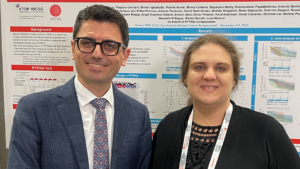This initiative presented by Dr Josephine Van Cauwenberge van University Hospitals Leuven aims to establish genomic risk scores for a specific cohort of clinically low-risk patients who did not undergo chemotherapy. Patient data of 2467 individuals, spanning the years 2000-2017, reveal that only 1.7% of this cohort experienced relapse within the initial five years. To assess the utility of the genomic risk score, we conducted a comparative analysis between patients who relapsed and matched control counterparts with similar characteristics but remained relapse-free. Additionally, we analyzed Agendia Mammaprints. Notably, no significant differences in genomic risk scores were observed between the relapsed and control groups. Intriguingly, a subset of patients with ultra-low scores exhibited relapse within five years. Further investigations are warranted to explore whether Mammaprints or alternative genomic risk assessments can aid in identifying patients at risk for early relapse. This study did not establish the clinical value of the genomic risk score.
Reference:
Van Cauwenberge J, Genomic risk analyses in patients with clinical low risk ER-positive HER2-negative early breast cancer developing an early metastatic event. SABCS 2023, #PO5-01-14


With the educational support of:
 |
 |
 |